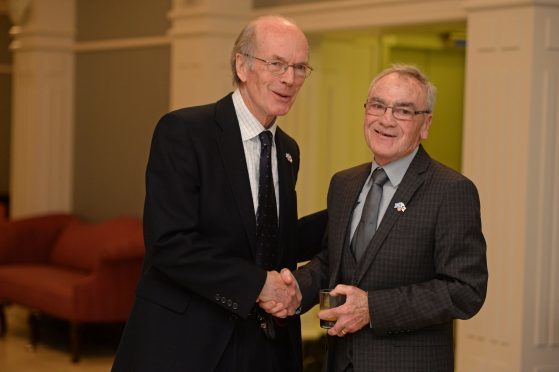Scotland’s oldest heart transplant survivor has had an emotional reunion with his life-saving surgeon after more than two decades apart.
Robert Colville, 73, could barely believe his eyes when he shook the hand of Professor David Wheatley, 75.
The pair were joined by First Minister Nicolas Sturgeon at the Royal Jubilee Hospital in Clydebank, West Dunbartonshire, to celebrate 25 years of heart transplants in Scotland.
Robert said that he was amazed by the progress modern medicine had made.
He said: “Back in the day if you said you had a heart transplant you got to the front of the queue, now if it comes up it’s like you’ve had a cold.
“I can remember in 1967 when I was working for Rolls Royce. We were on our tea break and someone came in with a newspaper and said, ‘Look, they’ve had the first heart transplant’.
“I said, ‘I wonder what that would be like.’ I never imagined it would be me.
“I actually felt alive after the transplant. Beforehand I was always feeling ill.”
Professor Wheatley, who performed the first heart transplant in Scotland in 1991, was inspired to become a surgeon at a young age
He said: “I was probably interested in heart surgery from around the age of 12 or 13.”
He had seen Christiaan Barnard, the South African doctor who pioneered the first heart surgery, at work and wanted to do the same type of surgery.
Wheatley, a former Professor of Cardiac Surgery for the British Heart Foundation, has vivid memories of his early days performing transplants in Scotland – including flying to Glasgow with a donor heart in a tiny prop plane.
He said: “At the time I started here in Scotland in 1992 we were having to go and pick up a donor heart and it could be anyway in the UK.
“A number of times I’d flown down to London or even as far as Cornwall to pick up a heart and then fly back with it – not in a commercial plane but in a small twin-seater.
“You could spend about twelve hours fetching the heart and getting it back and then you had to do the operation and look after the patient.
“It was a weekend gone so it was very tiring.
“The first one we did was on New Year’s Day and I remember flying back somewhere over Manchester and the pilot said that we’re the only plane in the sky.”
Professor Wheatley has since performed nearly two dozen heart transplants.
Since 1991 more than 350 have been carried out at the Royal Jubilee Hospital – 80 of which have taken place since the Heart and Lung Centre was opened by the Queen and Prince Charles in 2008.
Heart transplants are the final line of treatment for the 45,000 Scots whose lives have been threatened or limited by heart failure.
Dr Nawwar Al-Attar, Director of the Heart and Lung Centre, joked that he’d gotten used to standing on one foot for five hours and then shifting to another while operating.
He said: “You start from an ailing heart where it is not pumping and move to a situation where there is no heart because you’ve taken it out.
“For a few minutes that human being is without a heart, that vital organ, and you’re able to put a new one in and see that one taking over.
“It’s like seeing life regenerate. It’s a feeling like no other.”
The First Minister was full of praise for the transplant recipients and praised the efforts of the NHS staff at the hospital.
She said: “Part of my job is getting invited to lots and lots of events but I can say without fear of contradiction that this annual gathering is the most exclusive.”
Ms Sturgeon also celebrated the fact that Scotland had a larger number of organ donors than any other country in the UK.
She added: “We don’t know who they all are but I suspect for the people here there probably isn’t a week that passes when you don’t think of a donor.”
